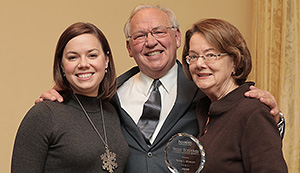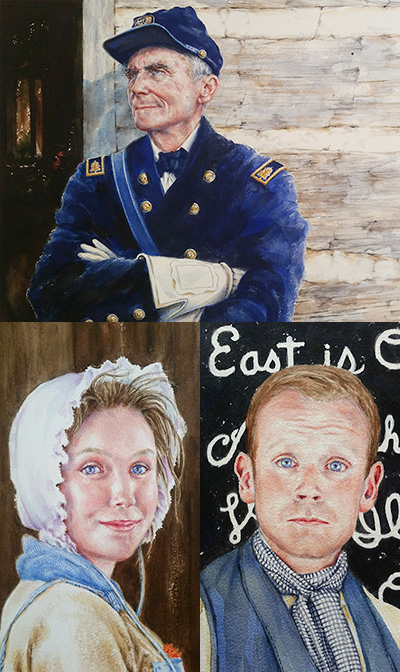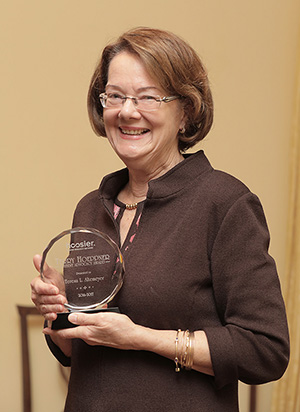The art of advocacy

“With cancer comes recognition of the fact that death is real, that you only are blest with so many days, and you only have so much time. But you also realize that you get to make choices about how you spend this measured time. When my diagnosis came, I decided how I wanted to spend this time — I chose advocacy and art. That was where I want to be, what I want to do.” Finding beauty in the midst of pain. It is a rare ability, but one that is not uncommon among a certain group of determined individuals: patient advocates.
“It is the beauty,” says Teresa Altemeyer. “When you soulfully paint someone’s eyes, you are trying to look as deeply as possible into a person and capture them. Likewise, when you are working with somebody who is a patient, you are trying to capture their essence, to answer questions that are profound.”
[Teresa is pictured with her husband, Don Altemeyer, and daughter Dana Altemeyer]
Teresa Altemeyer is a pillar in the Hoosier patient advocacy community and is the current board chair of the Indiana Chapter of the Leukemia and Lymphoma Society (LLS). HCRN recently honored Altemeyer with the Terry Hoeppner Patient Advocacy Award, named in memory of beloved Indiana University football coach Terry Hoeppner, who died from brain cancer in 2007. The award honors individuals who exhibit Coach Hep’s spirit and determination to champion their cause.
Without a doubt, Altemeyer’s creative and determined spirit steadfastly embodies Coach Hep’s iconic passion. It was kindled in her youth. “When I was eight years old, we moved to South America — to Venezuela — and lived there for five years, then moved back to Indianapolis. That experience put the magic in my life.

Watercolor paintings by Teresa Altemeyer, used with permission. Clockwise from top: The Union Preserved, School Teacher at Conner Prairie, and Girl with the Oxen Goad Stick.
“When I was a child living in South America, I would always doodle around and liked to draw,” Altemeyer continues. “My mother had a book club and occasionally people from the United States would come visit. One time I met a special gentleman — he was dapper, very Southern — he shook my hand and said, ‘I understand you like to draw and that you are a very good artist.’ That was William Faulkner. So, it has always stuck in my mind that I am an artist.”
She is an artist, and a celebrated one at that. But even her natural mode of expression was not spared from the grim effects of a cancer diagnosis. “After my children went off to college I had some extra time and I found a studio at the Stutz Building. I was painting in oil,” says Altemeyer. “I was an okay oil painter, but then when I was diagnosed with high risk Chronic Lymphocytic Leukemia, I developed a profound allergy to the oil paint. It was really traumatic for me because I used to say to people that I found God between the molecules in oil paint. When this was taken away from me I was an angry woman for about a year.”
Yet, it was not the end of Altemeyer’s passion, but its growth. “I decided to get over it, and I tried watercolor, and perhaps it was a better choice for me than the oil paint,” says Altemeyer. “I love to paint portraits; I love to paint faces.”
Altemeyer’s works have received high honors, and she currently has a studio at the Indianapolis Art Center.
Altemeyer’s cancer diagnosis not only led to the evolution one of her passions, but also to the fulfillment of another. “As strange as it may sound, I sometimes feel that I was meant to have cancer so I could be an advocate,” she says. “I look at all the things I have learned in my life prior to that point, and they were, step by step, teaching me how to be an advocate.”
 Altemeyer has been involved with volunteer and philanthropic initiatives all of her life, but her journey in cancer patient advocacy began about as soon as she became a cancer patient. It started when her doctor, Dr. Jose Azar at the IU Simon Cancer Center, confided a request. “I was his first patient when he finished his fellowship and it was a perfect patient/doctor match,” she recalls. “I came into my first three appointments and was this happy person, brought flowers for everybody, holiday cookies and everything. So, I think because of my attitude, on that third visit he said, ‘I would like for you to help me. I had a patient who just died, and on his death bed he made me and his wife promise that we would bring up a group that would help patients.’ The couple had felt like they had a directionless path, had no one to talk to, no one with whom to share what I now call ‘the tears in the night,’ no one with whom to confide their hopes or fears. They saw a wonderful doctor, but then you leave a doctor’s office and you have got all the rest of the hours in your life to figure out how to live. So, Dr. Azar asked me to be the facilitator and help bring up the support group. We began a few months later. Eight years have now passed since the group began.”
Altemeyer has been involved with volunteer and philanthropic initiatives all of her life, but her journey in cancer patient advocacy began about as soon as she became a cancer patient. It started when her doctor, Dr. Jose Azar at the IU Simon Cancer Center, confided a request. “I was his first patient when he finished his fellowship and it was a perfect patient/doctor match,” she recalls. “I came into my first three appointments and was this happy person, brought flowers for everybody, holiday cookies and everything. So, I think because of my attitude, on that third visit he said, ‘I would like for you to help me. I had a patient who just died, and on his death bed he made me and his wife promise that we would bring up a group that would help patients.’ The couple had felt like they had a directionless path, had no one to talk to, no one with whom to share what I now call ‘the tears in the night,’ no one with whom to confide their hopes or fears. They saw a wonderful doctor, but then you leave a doctor’s office and you have got all the rest of the hours in your life to figure out how to live. So, Dr. Azar asked me to be the facilitator and help bring up the support group. We began a few months later. Eight years have now passed since the group began.”
To arm herself for effective service, Altemeyer became fully invested. “I began to self-educate. I would look for resources, and went on a real campaign. I went to national conferences, several for doctors and some for doctors and patients, I learned everything I could about my disease and everything I could about a lot of other blood cancers. And I also found out about issues like oral parity and cancer bankruptcy.”
Eight years later, Altemeyer continues, an accomplished champion of cancer patient-to-patient support who not only gives to but receives from the group she helped to form. “Just because I facilitate a support group doesn’t mean I am not a part of the support group,” she says. “It is very real; it goes both ways.”
Altemeyer’s contribution to the progress of empowered, patient-centered care — through everything from direct patient interaction to advocacy on Capitol Hill for improved patient access to care — would be impossible without a ‘never quit’ attitude. Altemeyer may in part have it by inheritance. “I had a mother who was a role model for so much in my life,” says Altemeyer. “She died when she was just three months shy of 90, and she was never old. Not for a minute. She lived to help others until her last day.”
The Terry Hoeppner Patient Advocacy Award has special meaning to Altemeyer. “The fact that Hoosier Cancer Research Network conducts clinical trials makes this honor particularly meaningful for me,” she says. “I sit here most likely alive today because of having made a decision to go into a clinical trial. … I’m such a believer that these trials will be what will cure cancer, I have no question it will happen. But it is only when people raise their hand and say, ‘I will do my part,’ that it happens.”
About Hoosier Cancer Research Network:
Hoosier Cancer Research Network (formerly known as Hoosier Oncology Group) conducts innovative cancer research in collaboration with academic and community physicians and scientists across the United States. The organization provides comprehensive clinical trial management and support, from conception through publication. Created in 1984 as a program of the Walther Cancer Institute, Hoosier Cancer Research Network became an independent nonprofit clinical research organization in 2007. Since its founding, Hoosier Cancer Research Network has conducted more than 170 trials in a variety of cancer types and supportive care, resulting in more than 350 publications. More than 7,500 subjects have participated in Hoosier Cancer Research Network clinical trials.

Facebook
Hoosier Cancer Research Network on Facebook
Linked In
You Tube
Twitter